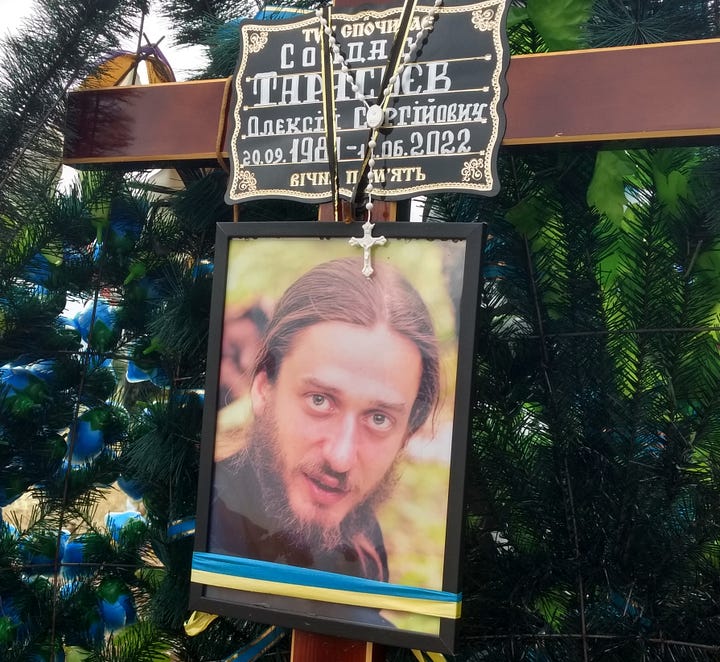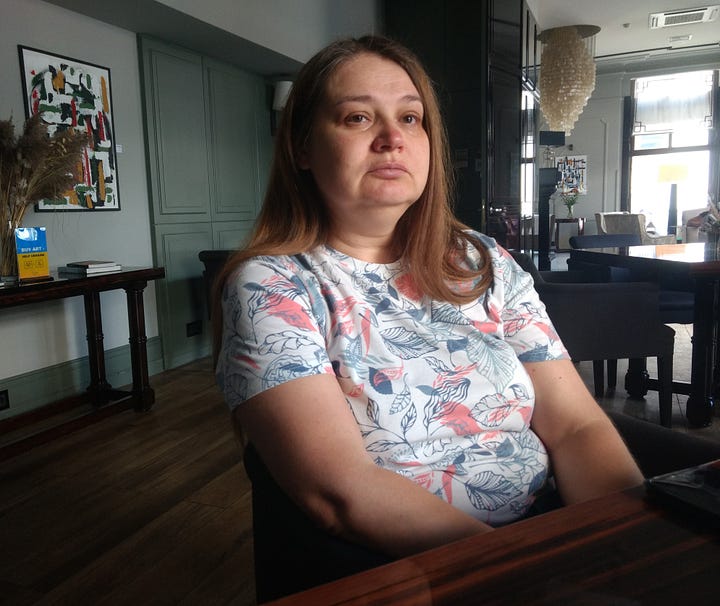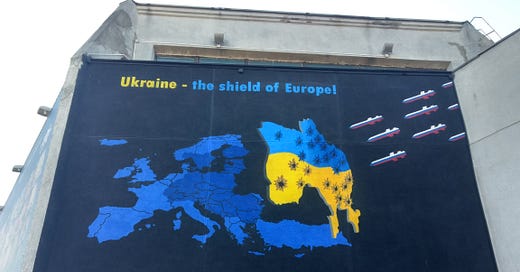American cowardice
As Russia’s invasion enters its fourth year, Ukraine must also fight a craven U.S. president
A painting that hangs outside a World War II museum in Kyiv depicts Ukraine as a buffer that protects the rest of Europe from Russian aggression. (c. Martin Kuz)
Fragments of sound crackled over a weak cellphone connection for several tense seconds before Nataliya Lipska made out her brother’s familiar voice. “Hello, sister,” Olexsiy Tarasyev said, his tone calm and relaxed. “I’m good.” Then he was gone, the call dropping before she could answer.
Russia launched its full-scale invasion of Ukraine three years ago today. The next morning, Olexsiy, 40, stood in line outside a territorial defense office in the western city of Lviv, where he worked as a chemist for OKKO, a national gas station chain. He volunteered for the military along with tens of thousands of other men and women in the war’s first weeks, and by April, he had landed on the front line as a combat medic. He worked to save the lives of soldiers defending the eastern city of Kharkiv from Russian forces advancing ever closer behind heavy missile and artillery fire.
Olexsiy’s decision to join completed his long-delayed entry into the armed forces. Principled and determined, and possessed of an eccentric code of propriety, he had spurned a lieutenant’s commission after graduating from university almost two decades earlier. He refused to cut off his ponytail and trim his beard — military regulations he considered pointless.
He stayed lean and strong in the ensuing years through his love of mountaineering. When his homeland came under attack, he shed past pride and accepted a slight pruning of his hair and beard to comply with military standards. Nataliya feared for and admired him in equal measure.
“I wasn’t happy that he signed up, but I understood,” she told me as we sat in a café a mile from Oleksiy’s grave in a Lviv cemetery. She tried in vain to reach him again after their brief call on June 12, 2022. The following day she learned that they had talked during the last hour of his life. An artillery strike killed him. His soft, soulful eyes, beacons that once drew in friends and strangers alike, would remain forever dark.
Three weeks later, when we met, Nataliya shut her eyes as tears poured forth. “Oleksiy knew what could happen,” she said. “He had the courage to go anyway.”


Olexsiy Tarasyev, 40, volunteered for Ukraine’s territorial defense force the morning after Russia launched its full-scale invasion three years ago today. An artillery strike killed him on June 12, 2022. His sister, Nataliya Lipska, briefly spoke with him by phone during what turned out to be the last hour of his life. (c. Martin Kuz)
Courage. I’ve thought a lot about that word the past month as the United States backs away from Ukraine while bowing to Russia, a dual act of cowardice performed before a global audience by President Trump. A synthetic strongman whose mythical bone spurs enabled him to duck the Vietnam draft, he provided an unhinged master class last week in how to blame the victim and flatter the perpetrator.
He upbraided Ukraine for the Russian invasion, called President Volodymyr Zelensky a “dictator” and sought to extort $500 billion in minerals from a nation that has lost tens of thousands of soldiers and civilians to the war. Typical of his slavering self-interest, Trump proffered nothing in return for the “rare earths,” a phrase he repeated like a toddler just starting to speak whole words.
His broadsides occurred as U.S. and Russian diplomats convened in Saudi Arabia for initial talks about ending the war without inviting Ukrainian or European officials to participate. The Trump administration further pressured Ukraine to remove references to “Russian aggression” in its annual U.N. resolution condemning Moscow for the war. When Ukrainian officials resisted, the administration drafted a competing resolution that elided the term and any mention of Ukraine’s territorial integrity, omissions that undoubtedly gave Vladimir Putin goosebumps. (The U.N. General Assembly will weigh the proposals today during its meeting in New York.)
So it is that, as the Russian dictator’s unprovoked war enters its fourth year, Ukraine must also fight a craven U.S. president. But if Trump believes Ukrainians will yield to his coercion in the manner of, say, Republicans in Congress, he will prove himself as ignorant as Putin about the country and its history of resolve.
Trump’s verbal attacks and Zelensky’s willingness to stand up to the U.S. blackmail campaign over minerals have rallied support for the Ukrainian president inside and outside the country. In response to Trump officials appeasing Putin and trashing European allies, Zelensky will host a summit today attended in person or online by officials from more than 30 Western nations. They will discuss how the rest of the democratic world can support and safeguard Ukraine amid America’s desertion.
The extraordinary defiance displayed by everyday Ukrainians at the war’s outset offers cause for hope — small as it might be — that with Europe’s backing they will survive the dystopian Putin-Trump alliance. Two weeks into the invasion, I met Volodymyr Havryliv, a rental car manager in Lviv who had joined the territorial defense force after Russian troops crossed the border. He told me that his son, who had turned 19 a month earlier, also signed up and soon would deploy to fight in southern Ukraine. At that moment, Volodymyr broke down, as much out of paternal pride as profound sorrow.
“I don’t want to be in a war and I don’t want my son to be in a war,” he said. “But I am ready. He is ready. We are all ready.”
Olexsiy Tarasyev embodied that same un-Trumpian instinct of self-sacrifice, choosing to run toward the front rather than to a podiatrist’s office in search of a bone spurs exemption. His example inspired Nataliya, the director of a charity in Lviv that provides support to children with cancer and their families.
When her brother signed up to fight, she embarked on her own volunteer mission with a local nonprofit that gathers medical supplies for troops. She vowed to continue the work as an homage to his memory. “He gave his life to his country,” she said. “So I am devoting mine.”
Her voice dropped away. She let the tears fall.
Etc.
— In a poignant essay for the New York Times, Artem Chekh, an author and a sergeant in the Ukrainian army, reflects on the exhaustion, pride and resolve of his country’s people after three brutal years of war.
— I’ll be joining Vicki Gonzalez, host of Insight on CapRadio, Sacramento’s NPR affiliate, at 12 pm PST today to discuss the state of the invasion. To tune in to the show, click on the Listen Live link in the upper-right corner here. (I’ll include a link to the recorded interview in my next newsletter.)
— I mentioned last week that Reporting on Ukraine was nearing 1,000 subscribers. A swell of sign-ups since then has pushed the newsletter over that threshold. I’d like to extend a warm welcome to those of you who are new here, and I want to express my gratitude to all of you who have started or renewed paid subscriptions. Your generosity makes my work possible. Many, many thanks for your support.
(On a related note, a couple of you have told me that you’ve encountered billing problems when you tried to renew. In most cases — though not all — an expired credit card is the culprit. Please drop me a note if you run into difficulties.)
— My sincere thanks for reading. I hope you’ll offer your comments below if you’re a paid subscriber — I’d like to know what you think. And remember that you can find me on Bluesky at martinkuz.bsky.social. Thank you.





Thank you for keeping us focused on the human costs in death and suffering inflicted by that KGB troll, that Stalinesque criminal who claims to have been elected the leader of Russia—and that blathering pig we are sadly forced to call President, who thinks he should be king.
I love this paragraph!
Courage. I’ve thought a lot about that word the past month as the United States backs away from Ukraine while bowing to Russia, a dual act of cowardice performed before a global audience by President Trump. A synthetic strongman whose mythical bone spurs enabled him to duck the Vietnam draft, he provided an unhinged master class last week in how to blame the victim and flatter the perpetrator.